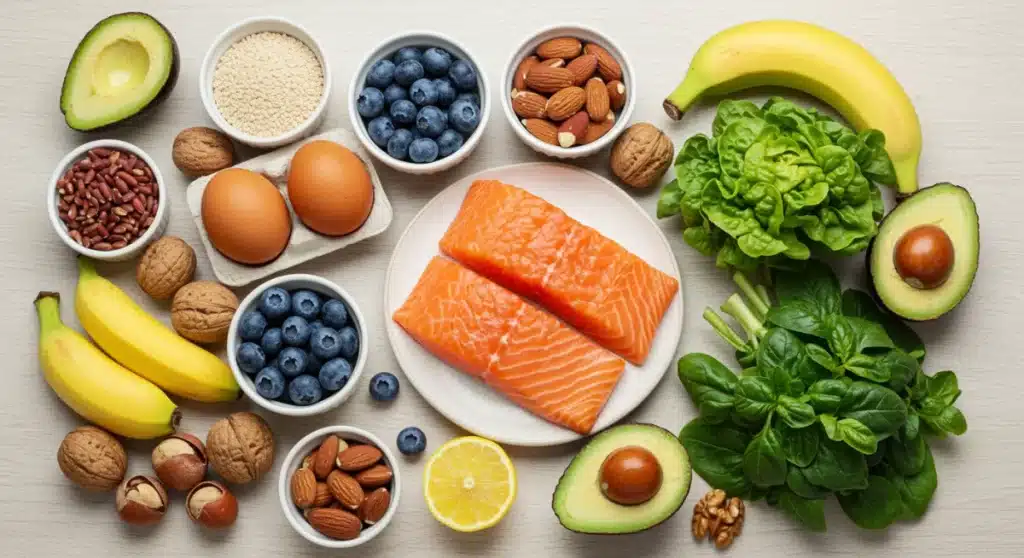Nutrition for Growing Minds: Top 8 Brain-Boosting Foods for Kids in 2025

Nutrition for Growing Minds: Top 8 Brain-Boosting Foods for Kids in 2025 (INSIDER KNOWLEDGE, PRACTICAL SOLUTIONS) reveals crucial dietary insights for enhancing children’s cognitive function, focusing on actionable food choices for optimal development.
As of late 2024, new research continues to underscore the profound impact of diet on cognitive development, bringing into sharp focus the importance of targeted nutrition. Parents are increasingly seeking reliable information on how to best support their children’s intellectual growth. This report, focusing on Nutrition for Growing Minds: Top 8 Brain-Boosting Foods for Kids in 2025 (INSIDER KNOWLEDGE, PRACTICAL SOLUTIONS), provides a timely overview of essential dietary components poised to make a significant difference in young minds.
The Crucial Role of Early Nutrition in Cognitive Development
Recent studies from institutions like the National Institutes of Health (NIH) confirm that the first few years of life are critical for brain development, making early nutrition a cornerstone for future cognitive abilities. The nutrients children consume directly influence brain structure, function, and overall mental performance. A diet rich in certain vitamins, minerals, and fatty acids can significantly enhance memory, focus, and problem-solving skills.
Experts emphasize that consistent intake of these vital nutrients supports neuronal growth and connectivity, laying a strong foundation for learning. Conversely, nutritional deficiencies can lead to developmental delays and impact academic performance. Understanding which foods offer the most benefit is paramount for parents navigating the complexities of child nutrition.
Omega-3 Fatty Acids: Essential for Brain Structure
Omega-3s, particularly DHA, are fundamental building blocks of brain tissue and neurotransmitters. They are vital for cognitive functions such as memory and learning. According to a report published in the Journal of Child Psychology and Psychiatry, children with higher DHA levels often exhibit better attention and behavior.
- Improved Cognitive Function: DHA supports the fluidity of cell membranes, crucial for signal transmission.
- Enhanced Learning Abilities: Regular intake is linked to better academic performance.
- Reduced Behavioral Issues: Some studies suggest a correlation with decreased hyperactivity.
Berries: Antioxidant Powerhouses for Memory and Learning
Berries, including blueberries, strawberries, and raspberries, are celebrated for their high antioxidant content, which protects brain cells from damage. These vibrant fruits contain anthocyanins, powerful compounds that cross the blood-brain barrier and accumulate in areas of the brain responsible for learning and memory. Daily consumption can lead to noticeable improvements in cognitive speed and retention, as reported by pediatric nutritionists.
The anti-inflammatory properties of berries also play a role in maintaining a healthy brain environment, crucial for sustained cognitive function. Integrating a variety of berries into a child’s diet ensures a broad spectrum of these beneficial compounds, supporting overall brain health and resilience against oxidative stress.
Flavonoids and Their Impact on Brain Health
Flavonoids found in berries are not just antioxidants; they also interact with signaling pathways involved in cell survival and memory. This interaction can enhance neurogenesis, the process of forming new neurons, particularly in the hippocampus, a brain region vital for memory.
- Neuroprotection: Flavonoids shield neurons from damage caused by free radicals.
- Enhanced Neurogenesis: Supports the growth of new brain cells, particularly in memory centers.
- Improved Blood Flow: Promotes better circulation to the brain, optimizing nutrient delivery.
Eggs: A Complete Package for Growing Brains
Eggs are often hailed as a superfood for their comprehensive nutritional profile, especially for children. They are an excellent source of choline, a critical nutrient for brain development and memory. Choline is a precursor to acetylcholine, a neurotransmitter essential for regulating mood, memory, and muscle control. A single egg provides a significant portion of a child’s daily choline requirements, making it an easy and effective dietary addition.
Furthermore, eggs contain protein, iron, and vitamin B12, all of which are vital for healthy brain function. Protein supports brain cell growth and repair, iron prevents fatigue and improves concentration, and vitamin B12 is essential for nerve health and cognitive processes. Incorporating eggs into breakfast or snacks ensures a steady supply of these brain-boosting elements.

Leafy Green Vegetables: Nutrient Density for Optimal Function
Leafy green vegetables such as spinach, kale, and Swiss chard are packed with vitamins K, lutein, folate, and beta-carotene, all linked to brain health. Vitamin K is crucial for fat synthesis in the brain, while lutein and beta-carotene act as powerful antioxidants. Folate plays a key role in neurotransmitter synthesis and DNA repair, making these greens indispensable for cognitive vitality. A recent report by the American Academy of Pediatrics highlighted the importance of early and consistent exposure to a variety of vegetables to foster healthy eating habits and cognitive benefits.
Despite the common challenge of getting children to eat greens, creative preparation methods can make a significant difference. Blending them into smoothies, adding them to sauces, or incorporating them into baked goods can increase intake without resistance. The long-term benefits for brain function far outweigh the initial effort.
Nuts and Seeds: Healthy Fats, Vitamin E, and Zinc
Nuts and seeds are miniature powerhouses of nutrition, offering healthy fats, vitamin E, zinc, and magnesium—all critical for brain health. Walnuts, for instance, are rich in omega-3 fatty acids, while almonds provide vitamin E, an antioxidant that protects brain cells from oxidative stress. Pumpkin seeds are an excellent source of zinc, vital for memory and thinking skills, and magnesium, known for its calming effects and role in nerve function.
Introducing a variety of nuts and seeds as snacks or additions to meals can provide a sustained energy release for the brain, preventing blood sugar crashes that can impair concentration. It is important to consider potential allergies and offer age-appropriate forms, such as finely ground nuts for younger children, to ensure safety and maximum benefit.
The Benefits of Zinc and Magnesium
Zinc is involved in numerous enzymatic reactions in the brain and is critical for synaptic plasticity, the brain’s ability to adapt and learn. Magnesium, often called nature’s tranquilizer, plays a role in nerve transmission and muscle contraction, contributing to overall mental well-being and focus.
- Memory Enhancement: Zinc supports neural pathways involved in memory formation.
- Stress Reduction: Magnesium helps regulate neurotransmitters that control stress responses.
- Improved Focus: Both minerals contribute to sustained attention and cognitive clarity.
Fatty Fish: The Ultimate Omega-3 Source
Fatty fish like salmon, mackerel, and sardines are renowned for their exceptionally high content of omega-3 fatty acids, particularly DHA and EPA. These essential fats are vital for brain development and function, supporting everything from cognitive processing speed to mood regulation. Regular consumption has been linked to improved academic performance and reduced symptoms of ADHD in several peer-reviewed studies.
The American Heart Association recommends at least two servings of fatty fish per week for children, acknowledging its profound benefits for cardiovascular and brain health. For children who are reluctant to eat fish, fish oil supplements can be a viable alternative, though whole food sources are always preferred for their synergistic nutrient profiles.
Oatmeal: Sustained Energy for Peak Brain Performance
Oatmeal is more than just a breakfast staple; it is a complex carbohydrate that provides a steady supply of glucose to the brain, essential for sustained energy and concentration. Unlike simple carbohydrates that cause rapid spikes and crashes in blood sugar, oatmeal’s slow-release energy helps maintain stable cognitive function throughout the morning. It is also rich in fiber, which supports digestive health, indirectly impacting mood and focus through the gut-brain axis.
Fortified oats often contain iron, zinc, and B vitamins, further enhancing their brain-boosting properties. A warm bowl of oatmeal with added fruits and nuts can be a perfect start to a child’s day, ensuring they have the fuel needed for learning and play without the jitters associated with sugary alternatives.
Avocados: Healthy Fats for Brain Health and Development
Avocados are a unique fruit, celebrated for their high content of monounsaturated fats, which are crucial for healthy blood flow to the brain. Improved blood flow means better delivery of oxygen and nutrients, essential for optimal brain function. They also contain lutein, a carotenoid linked to improved cognitive function in children, and vitamin K, which supports brain health.
Beyond healthy fats, avocados provide a good source of fiber, potassium, and vitamins C and E. Their creamy texture makes them versatile for various dishes, from guacamole to smoothies, making it easier to incorporate this brain-boosting fruit into a child’s diet. Regular consumption can support overall brain vitality and long-term cognitive health.
| Key Brain Food | Primary Benefit for Kids |
|---|---|
| Fatty Fish | Rich in Omega-3 DHA for brain structure and cognitive function. |
| Berries | High in antioxidants protecting brain cells and improving memory. |
| Eggs | Excellent source of choline for memory and brain development. |
| Leafy Greens | Packed with vitamins K, lutein, and folate for optimal brain health. |
Frequently Asked Questions About Kids’ Brain Nutrition
The most critical nutrients include Omega-3 fatty acids (especially DHA), choline, iron, zinc, and B vitamins. These support brain structure, neurotransmitter function, and cognitive processes like memory and learning, forming the foundation for healthy intellectual growth.
Encourage picky eaters by offering small, consistent portions, involving them in meal preparation, and making food fun. Hide vegetables in smoothies or sauces, and introduce new foods alongside familiar favorites. Patience and persistence are key to developing varied eating habits.
For most children consuming a balanced diet rich in whole foods, supplements are not typically necessary. However, if dietary restrictions or specific medical conditions exist, a pediatrician or registered dietitian may recommend certain supplements to address potential nutrient gaps. Always consult a professional.
Nutrition is particularly critical during the first 1,000 days of life, from conception through a child’s second birthday, and continues to be vital throughout early childhood. This period marks rapid brain growth and development, making optimal nutrient intake essential for long-term cognitive health.
Yes, foods high in processed sugars, unhealthy fats, and artificial additives can negatively impact cognitive function. They can lead to energy crashes, inflammation, and interfere with nutrient absorption, potentially affecting concentration, memory, and overall brain health. A balanced diet is crucial.
Looking Ahead: Integrating Nutrition into Educational Frameworks
The ongoing emphasis on Nutrition for Growing Minds: Top 8 Brain-Boosting Foods for Kids in 2025 (INSIDER KNOWLEDGE, PRACTICAL SOLUTIONS) signals a broader shift towards integrating dietary considerations into educational and public health initiatives. As new data emerges, expect to see more school programs, parental resources, and policy discussions centered on optimizing children’s diets for cognitive advantage. This proactive approach aims to equip the next generation with the best possible foundation for learning and intellectual growth, making informed nutritional choices a cornerstone of child development strategies.





